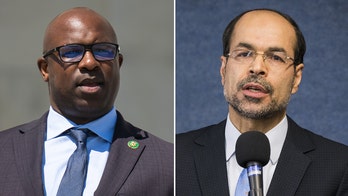Wisconsin Democrats have made their choice. Now both parties are preparing for a costly and bruising fight to the finish in the state's gubernatorial recall election.
Milwaukee Mayor Tom Barrett, after Tuesday night's primary, will now face off against Republican Gov. Scott Walker in the state's closely watched recall. Barrett will effectively lead his party into the final stretch of the ideological battle that has kept the Dairy State bitterly divided for a year-and-a-half and the nation looking to Wisconsin as a weather vane for national partisanship.
Barrett narrowly lost to Walker in the 2010 gubernatorial race. He seemed an obvious choice for a second round. If his victory speech in downtown Milwaukee Tuesday was any gauge, the final stretch is going to be nasty.
The newly minted Democratic contender hammered Walker for the job losses in the Dairy State and emphasized that two-thirds of Walker's record-breaking $25 million war chest came from wealthy conservative contributors outside Wisconsin.
"Scott Walker, instead of staying home in Wisconsin and focusing on creating jobs here, has decided that he is going to be a rock star," Barrett said. "A rock star to the far right in this nation."
Donors to Walker's recall campaign include many familiar names -- casino owner Sheldon Adelson, who supported Newt Gingrich's presidential run; Foster Friess, who backed Rick Santorum; Orlando magic owner Rich DeVoss; and Bob Perry who created the infamous "swift boat" ads.
Walker is also supported by Americans for Prosperity, a group founded by the wealthy Koch brothers who are often portrayed as political villains by the left.
The embattled governor says he needs all the support he can get to fight against the power lust of big labor.
"Do we want to go back to the days when a handful of special interests controlled our state and local governments? No, instead we put reforms in place that rightfully put the hardworking taxpayers of Wisconsin in charge," Walker said to his supporters.
Labor is spending big money in this race -- $7 million came from labor, according to the latest financial disclosures. The Democratic Governor's Association is also weighing in though they are sly about it. They contribute money to the Greater Wisconsin Political Fund, which produces some of the most negative ads of this campaign.
However, Republican governors are weighing in through a PAC called Right Direction.
As broadcast outlets profit and Wisconsin viewers are bombarded with partisan messages, even the chair of the State Democratic Party Mike Tate admits the party has lost control of the message. He was recorded telling volunteers, "It's not the party that pays for the ads. It's the candidate's money and a lot of the money is from third party groups that we can't talk to at all."
Mordecai Lee, professor of government affairs at the University of Wisconsin-Milwaukee, says that is the new reality in politics. "Super PACs and other third parties are really going to be able to define what an election is all about."
A victory will be all about motivating the base to turn out. That is because the undecided vote in Wisconsin is so small; minds are made up and few are persuadable. The winning side is the one that gets the most supporters on their feet when Election Day rolls around.
Republicans claim they have the advantage in that department and point to the highest turnout for a primary in 60 years. Though Walker was only up against a protest candidate on Tuesday, 626,538 Wisconsin Republicans cast a ballot to prevent a fluke. A spokesman for that party says that shows the state GOP has a better ground game than opponents on the left.
Tate says Democrats will turn out when it means getting Walker out of office. "We are set up in great shape to with this, and on June 5 this is going to be a turnout fight, and I feel really good about our abilities to win," Tate said.





